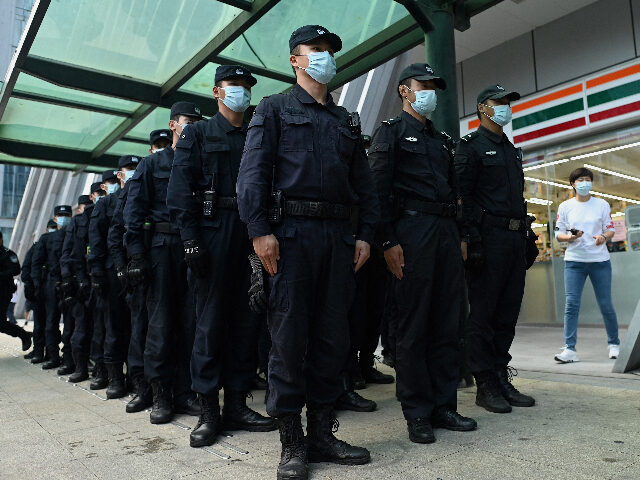Chinese police descended upon the financial services arm of doomed property giant Evergrande on Saturday night, arresting numerous employees at the company’s Shenzhen offices, possibly including General Manager Du Liang.
The South China Morning Post (SCMP) reported that the arrests followed Friday’s takeover of the Evergrande life insurance company by a state-owned firm and Saturday’s announcement that a case had been filed against the Evergrande Financial Wealth Management Company over violations of disclosure regulations.
Shenzhen police did not reveal exactly how many people they arrested, but the SCMP noticed a reference to “Du” as the surname of one detainee. The general manager of the Evergrande financial subsidiary is named Du Liang.
Du faced an angry mob of investors two weeks ago after they were unable to recover the money they poured into Evergrande investments. Surrounded by security guards linked into a human chain to hold irate customers at bay, Du admitted he was able to get his own money back in May because he faced “some family issues” and needed the funds.
The crowd was not mollified by his explanation; in fact, one woman collapsed, prompting a weary-looking Du to explain that it was simply impossible to pay off the $5.5 billion in mature investment products to some 200,000 investors. Evergrande management previously proposed payoff schemes, like repaying investors in installments or offering them property in lieu of cash repayment.
The Evergrande Group said that Du and a half-dozen other managers were “reprimanded” for cashing out their own investments and were ordered to return the money.
The notice from Shenzhen police said the case remains “under further investigation” and invited the public to contribute information about suspected fraud by phone, text, mail, or Internet.
Shares in the China Evergrande Group plunged by up to 25 percent in trading on Monday after the Shenzhen arrests were announced.
In August, Evergrande filed for bankruptcy protection in a U.S. court, protecting the company’s assets against American and European creditors, who hold most of its corporate debt. China’s property sector covers about 30 percent of its Gross Domestic Product (GDP), and Evergrande is currently the second-largest company in the industry, so a corporate implosion could trigger a cascade of insolvency that would send shockwaves across China and around the world.
China’s state-run Global Times strove to present the first police action against Evergrande employees as a necessary act of corporate hygiene that proves Beijing has “gone a step further in tackling the problems of its property market”:
Evergrande’s three main listed companies – China Evergrande Group, Evergrande Property Services Group and China Evergrande New-Energy Vehicle Group – have issued their financial statements and resumed trading on the Hong Kong stock market.
On Friday, China released data related with the real estate sector in the first eight months, showing that recovery signs were emerging. New home sales totaled 73.86 million square meters in August, up 4.8 percent from July, according to data released by the National Bureau of Statistics on Friday.
A month-on-month upward trend has begun to appear. Market sentiment is clearly positive, Yan Yuejin, a research director at Shanghai-based E-house China R&D Institute, told the Global Times on Sunday.
“Some foreign media rushed to talk down China’s real estate sector after Friday’s data release,” the Global Times hissed, without bothering to mention why: Moody’s had just downgraded its outlook for the Chinese property sector from “stable” to “negative.”
“Moody’s said it expected contracted sales to fall by about 5% over the next six to 12 months in China, and the impact of government measures to boost property purchases was likely to be short-lived and uneven,” Reuters noted Thursday.
Moody’s also gave a negative rating to China’s other wobbly property giant, Country Garden Holdings, which has avoided defaulting on its debts at the last minute twice over the past month.
Country Garden is now counting down a 30-day grace period until it defaults on a $15 million interest payment.
Failure to make this last-ditch payment would trigger a string of defaults on the company’s other credit lines. Few analysts believe Country Garden can come up with $15 million by the middle of October without shorting some of its other repayment plans.

COMMENTS
Please let us know if you're having issues with commenting.